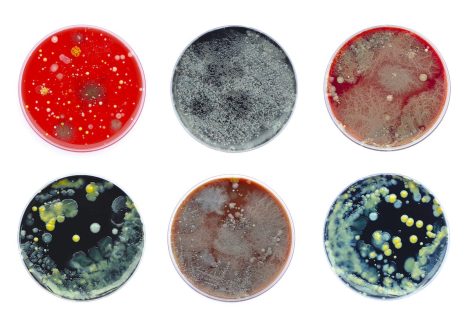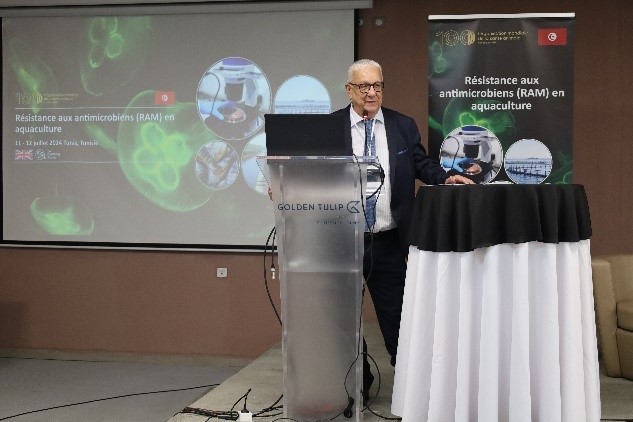
AMR is a global public and animal health concern that is influenced by the usage of antimicrobial agents in people, animals and elsewhere. Those working in the human (public), animal and environmental sectors have a shared responsibility to address the risk factors for the selection and dissemination of antimicrobial resistance.
Since the establishment of the Global Action Plan (GAP) on Antimicrobial Resistance (AMR) (68th WHO World Health Assembly, Geneva, Switzerland, 2015), most members of the World Health Organisation (WHO) have developed and implemented a National Action Plan (NAP) based on a “One Health” approach to AMR.
However, aquaculture, significant among the food producing sectors, has often been overlooked in AMR containment interventions.
Over the past decades, the growth of the aquaculture industry has led to the increasing use of antibiotics or chemical disinfectants for the prophylaxis or treatment of infections in aquatic animals. Antibiotics used in aquaculture are most often delivered in feed, sometimes by immersion of fish or other aquatic animals in closed tanks containing antimicrobials.
More than 80% of the delivered antimicrobials can be found in the water or sediment of the farming sites, which are not always equipped to filter and recover uneaten feed. The antimicrobial activity of unused medicines and their metabolites from fish faeces, even when treated, can remain intact for several months at concentrations high enough to exert a selective pressure on the bacterial diversity in the environment. This favours the selection of bacterial mutants that are resistant, a horizontal transfer of antibiotic resistance genes and their possible dissemination to animal and human populations.
Dr Hajer Kilani giving the opening remarks on behalf of Dr Sana Kacem (Tunisia Delegate).
In this regard, and under its mandate in the Quadripartite, WOAH has been organising workshops on AMR in aquaculture. The first workshop held in Durban, South Africa, in 2019 was aimed at familiarising officials from the veterinary services and the fisheries services of the countries of the Southern African Development Community (SADC) with antimicrobial use in aquatic animals as captured in the WOAH Aquatic Animal Health Code and to create awareness on AMR in aquaculture.
A follow-up workshop jointly organised bythe WOAH Subregional Representations for Eastern and Southern Africa was held in Maputo, Mozambique in 2022. This was projected to revisit the recommendations that were made during the Durban workshop, as well as to advocate for the meanwhile adopted WOAH Global strategy on aquatic animal health.
Dr Rachid Bouguedour (Representative of the WOAH North Africa region) delivering the opening remarks
The workshop’s main objective was to engage with the (a) National focal points for Aquatic Animals and (b) National focal points for Veterinary Products or AMR National contact points, to discuss progress made in incorporating AMR in aquaculture into AMR NAPs while taking stock of the commitments made in the previous meeting(s) in Durban, Maputo and (in 2023) in Kigali, Rwanda (the same workshop, but for English-speaking participants).
Moreover, this meeting was an opportunity to share the advances made by the Quadripartite in addressing AMR in aquaculture, including highlighting AMR in the environment while emphasising the need for proper waste management from aquaculture establishments.
Lastly, the workshop aimed at complementing efforts towards the development of a roadmap on the next steps with clear actionable points for implementation.
The training was held in Tunis, Tunisia, from 10 to 11 July 2024 and was attended by 30 WOAH National Focal Points for Aquatic Animals and National Focal Points for Veterinary Products/AMR National Contact Points from 18 (French-speaking) African countries. Besides WOAH regional (Tunis) and head office staff (AMR and Veterinary Products Department, Paris), contributions were made by three international experts (in alphabetical order): Mickael Teixeira Alves (UK), Larry Hammell (Canada), and Amedeo Manfrin (Italy). Moreover, the African Union (AU-IBAR) – Mrs. Nelly Isyagi (pre-recorded presentation), WAEMU – Ms. Maimouna Sidibe and FAO – Ms. Melba Reantaso (pre-recorded presentation) were represented. Overall, 13 presentations were delivered.
Participants engaged in 3 working group session, focusing on:
The use of MentiMeter™ polls and quizzes led to interesting insights into the views and level of knowledge of the participants.
Countries represented at the training were:



